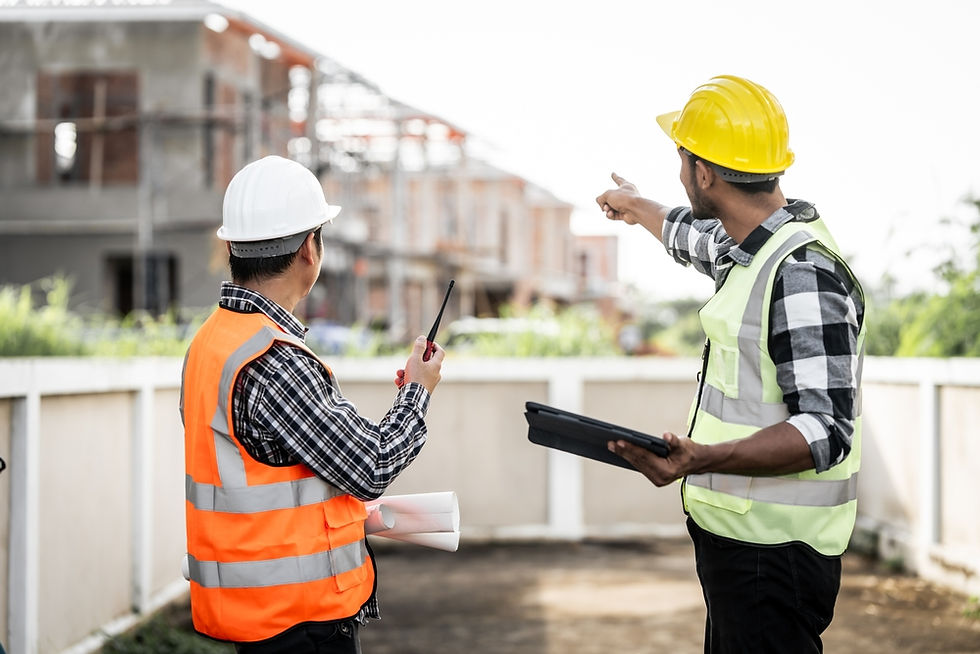5 Tips for Hiring the Right Structure Consulting Engineer in Today’s Market
- Lauren Bracy
- Aug 8, 2025
- 4 min read
Choosing the right structure consulting engineer in today’s construction landscape can significantly impact your project’s safety, compliance, and overall success. With building codes evolving rapidly, climate-adaptive design becoming mainstream, and financial accountability tighter than ever, the importance of engaging the right engineering professional has never been greater.
Whether you're developing a new home, renovating a commercial space, or overseeing a public infrastructure project, the structural consulting expert you hire will shape every critical design and construction decision. This guide outlines five essential tips to help you select a qualified and dependable structure consulting engineer in today’s highly competitive market.
What is a Structure Consulting Engineer and Their Benefits

A structure consulting engineer is a licensed professional who focuses on the design, assessment, and optimization of load-bearing structures. Their job involves calculating the structural integrity of a building, ensuring that it can withstand weight, environmental pressures, and time.
Benefits of Hiring a Structure Consulting Engineer:
Improved safety: Their calculations prevent structural failure, foundation cracks, or dangerous design flaws.
Cost-efficiency: They help minimize waste and overuse of materials through optimized design.
Regulatory compliance: They ensure adherence to all local and national building codes.
Sustainability insight: They can incorporate energy-efficient and green building standards.
Future-proofing: Their design anticipates environmental risks such as seismic loads, floods, or high wind areas.
In essence, they don’t just make buildings stand—they ensure they last.
Structure Consulting Engineer Credentials and Licensing
Before hiring anyone, it’s critical to verify their professional qualifications. A credible structure consulting engineer should possess more than just a degree—they need recognized licensure and relevant certifications.
Essential credentials to look for:
Bachelor’s or Master’s degree in structural or civil engineering from an accredited university.
Registered professional engineer (RPEng or CPEng) status, depending on your local licensing body.
Membership in engineering institutions such as the Institution of Structural Engineers (IStructE) or Engineers Australia.
Professional indemnity insurance and public liability cover to protect both you and the engineer from unforeseen issues.
Also, ask if they undertake continuing professional development (CPD) to stay updated with the latest codes, materials, and techniques.
Review Project-Specific Experience
Not all engineers are built the same. One might specialize in residential timber-framed houses, while another is experienced in multi-storey commercial structures or bridge design.
Ask these questions during your initial consultation:
Have you worked on projects similar in scale and complexity to mine?
Do you have experience with concrete slab foundation design or steel frame analysis, depending on what your project requires?
Can you show recent case studies or portfolio samples?
Have you collaborated with architects and builders on similar timelines and budgets?
When an engineer understands your specific challenges—whether it’s narrow urban lots, custom architecture, or large-span commercial roofs—they’ll design smarter, faster, and more effectively.
Assess Knowledge of Local Building Codes and Modern Construction Standards
One of the most overlooked—but critical—qualities is how well the engineer understands regional building regulations and modern construction standards.
Why this matters:
Each locality has specific codes based on soil conditions, weather risks, and zoning laws.
Building approval delays often stem from non-compliant structural plans.
Climate-resilient and green building standards are rapidly evolving in many regions.
A qualified structure consulting engineer will already be familiar with relevant codes such as AS/NZS 1170 (structural design actions), AS 3600 (concrete structures), and NCC (National Construction Code) compliance.
Ask whether they are capable of designing for seismic loads, wind bracing, or cyclonic regions if applicable. Their response will show how current they are with new engineering methodologies and adaptive design strategies.
Evaluate Communication and Collaboration Abilities

Technical expertise means little if the engineer can’t explain their ideas or collaborate with your team. Communication is key to smooth workflow between your engineer, architect, builder, and local authorities.
Signs of a great communicator:
They listen carefully to your project goals.
They explain technical data in understandable terms.
They’re responsive and punctual with project updates.
They can produce clear, detailed engineering drawings that builders can execute easily.
Engineering isn’t just about math—it’s about translating technical concepts into tangible results. Make sure your structure consulting engineer is a proactive, responsive partner, not just a contractor.
Compare Proposals Based on Value, Not Just Price
Engineering is one area where “cheaper” rarely means better. While it’s essential to stay within budget, choosing an engineer based solely on the lowest quote may cost you more in rework, redesigns, or construction delays.
What to assess in proposals:
Scope of services (site visits, design development, revisions, construction support)
Depth of detail in structural drawings and reports
Delivery timelines and milestone expectations
Clarity of fees and what's included or excluded
Also, determine if they provide ongoing site inspections during construction or offer support when submitting plans for council approvals. These extras are often worth the additional cost for peace of mind.
Choose an engineer who balances technical depth, timely delivery, and project-specific insight—not just one who offers the lowest bid.
Conclusion
Hiring the right structure consulting engineer is not just about checking off a list—it’s about finding someone who can navigate the technical, regulatory, and practical aspects of your build with confidence and clarity.
From verifying credentials and assessing project-specific experience to understanding building codes and evaluating communication, these five tips will help you make a well-informed hiring decision.
When you choose the right professional, you’re not just investing in engineering—you’re investing in the success, safety, and longevity of your entire project.




.png)





Khelraja’s india slot game collection celebrates vibrant culture and thrilling gameplay. Players can explore locally inspired themes alongside international favorites, all while enjoying a safe and user-friendly interface. With exciting features and real rewards, these slots offer endless fun. The india slot game selection at Khelraja is perfect for players seeking an authentic and rewarding experience.